Education activist Michael Charney is a key strategist and supporter of the Zinn Education Project’s campaign to Teach Reconstruction and the Prentiss Charney Fellows.

Michael Charney speaking at dedication of Thaddeus Stevens statue. April, 2022. Photo by Larry Miller.
Charney argues that in these times, it is critically important to teach about the vision offered by the interracial coalition during the Reconstruction era that brought public education, the right to vote, and other progressive policies to people of all races.
Fiercely dedicated to the cause of young people learning about Reconstruction, Charney donated in 2016 for the development and promotion of lessons and workshops on Reconstruction. Once those caught on, he suggested we move from providing resources for individual teachers to ensuring that Reconstruction was embedded in the curriculum. Toward that end, he provided the core funding for a national report on teaching about Reconstruction. The Zinn Education Project released this comprehensive, two-year study of state standards, Erasing the Black Freedom Struggle, in January 2022. He also recognizes the need for grassroots leadership to sustain this work, which led to the creation of the Prentiss Charney Fellows.
Here is a brief introduction to Charney’s work and philosophy.
Education Policy and Practice Advocate
Charney has been a passionate educator, political strategist, and labor organizer his whole life, committed to ensuring his students and the broader community learn the truth about U.S. history and have a voice in their own education.
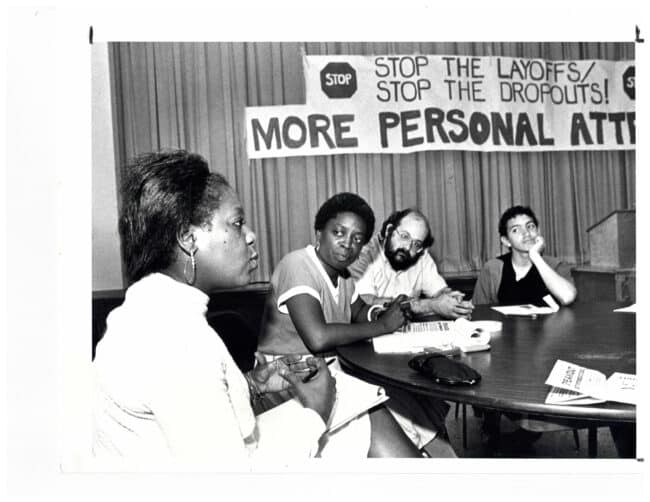
Cynthia Triplett (concerned parent), C. J. Prentiss (school board), Michael Charney (teacher), and Javier Rosa (student) at a public forum on education in Cleveland in 1987. Used with permission of The Plain Dealer.
He worked for more than three decades in the Cleveland Schools — as a public school social studies teacher and vice president of the Cleveland Teachers’ Union. Charney also was the union’s professional issues director, working to improve student literacy. He was one of the founders of the Cleveland Teachers Academy, a professional development project.
Author
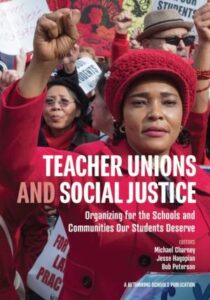 Charney wrote curriculum guides to support student organizing, including Fulfilling the Promise of America: The Struggle for Voting Rights, The Minimum Wage and the Youth Vote, and The Present as History: A Look into the Origins of the Cleveland School Desegregation Case.
Charney wrote curriculum guides to support student organizing, including Fulfilling the Promise of America: The Struggle for Voting Rights, The Minimum Wage and the Youth Vote, and The Present as History: A Look into the Origins of the Cleveland School Desegregation Case.
In 2021, he co-edited the Rethinking Schools book Teacher Unions and Social Justice: Organizing for the Schools and Communities Our Students Deserve. Additional articles by Charney include:
“High Court Takes Up Vouchers,” Rethinking Schools (Winter, 2001)
“An Open Letter to Bill and Melinda Gates,” Rethinking Schools (Summer, 2005)
“Tom Mooney – Ohio’s Children Lose a Labor Leader,” Rethinking Schools (Spring, 2007)
Reconstruction
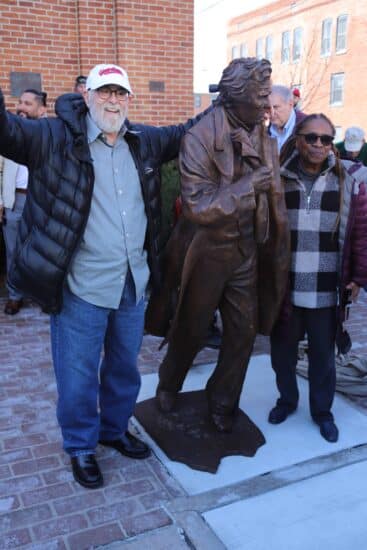
Michael Charney and C. J. Prentiss with statue of Thaddeus Stevens, 2022 in Gettysburg, Pennsylvania. Photo by Larry Miller.
Charney’s dedication to Reconstruction is evident in how he pursues every avenue possible to make sure people learn about Reconstruction, including this example about the Reconstruction era Radical Republican Thaddeus Stevens. He explains:
We named our dog Thaddeus. When I walked my dog, people would ask me what’s his name, and I’d say, “Thaddeus.”
When they looked puzzled, I would say, “Named for Thaddeus Stevens.”
“Who’s that?” they would ask.
There was my opening to enlighten them about Stevens, with his unflinching commitment to both racial equality and economic equality for the newly freed people.
Charney was a major funder for the Gettysburg statue of Thaddeus Stevens, dedicated in April of 2022.
Early Years
When asked what inspired his activism, Charney shared childhood memories:
Growing up in western Massachusetts, my parents were involved in the Friends of SNCC, a support group for the grassroots organizing in the South.
When I was 12, my parents raised some money to purchase something from a SNCC cooperative in Mississippi. For my costume that Halloween, I went as a SNCC organizer, with overalls and the SNCC button with black and white hands shaking. That was my introduction to SNCC, which is different from many people who connected to the Civil Rights Movement through King-inspired protests. It gave me a grassroots outlook on social change.
When I was in 6th grade, my morals and ethics teacher in Temple Emanuel was Abbie Hoffman. This was before he became a Yippie — a leading spokesperson for the Youth International Party. He was a SNCC organizer, more or less, in the North and incredibly provocative. He walked in the first day and he said, “You see where the students are protesting against United States control of the Canal Zone?” None of us even knew what the Canal Zone was! The next time he came, he said, “Two hundred yards from this temple, there are Jewish homeowners who won’t sell to Negroes.” He knew that because he had been involved in fair housing testing.
A few years later, I read Howard Zinn’s book SNCC: The New Abolitionists.
So, by the age of 14, I had an understanding of U.S. imperialism, Northern racism, and the importance of grassroots organizing. That was my early political development.
Educator and Organizer
In 1967, at the age of 17, through Temple Mitzva Core, Charney spent a few weeks in Roxbury with Black communities. Responding to Stokely Carmichael’s analysis that whites need to organize whites, Michael decided to become a high school teacher to organize against racism.
He became a high school teacher in Cleveland at a school that was 90 percent white (before desegregation). Administrators blamed Charney for a student-led protest against school policies and he was sent to the Superintendent’s office. With the support of a lawyer (who had also represented the American Indian Movement in South Dakota), Charney was transferred to adult education, which he enjoyed.
Around this time, a court order brought desegregation and busing to Cleveland. Charney strategized how to avoid the racist violence that had erupted with court orders in other cities. He helped to create a program called WELCOME with a message based on the SNCC logo.
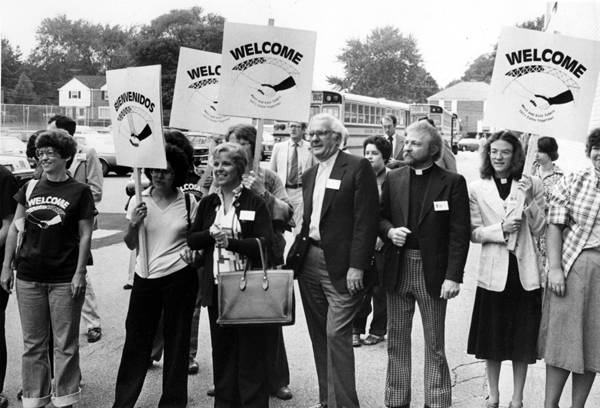
West Siders and East Siders Let’s Come Together (WELCOME) group greet school children at John Marshall High School
This is how he met his future wife and political collaborator, C. J. Prentiss, a Black organizer doing similar desegregation and non-violence work. Prentiss said, “Desegregation is the first step; what we really need is economic equality.” Michael went on six-week and 11-week strikes because of budget issues. He was granted a leave of absence to work on the WELCOME Institute, which evolved into Youth United to Oppose Apartheid in the mid-1980s. C. J. became a delegate for Jesse Jackson in 1984, and together they worked with the Rainbow Coalition in 1987–1988.
In the late 1980s, three things happened to engage Michael as a political organizer:
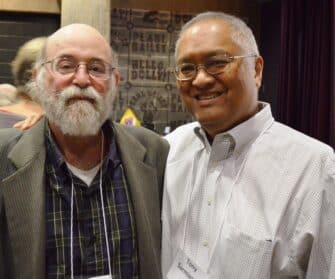
Michael Charney and fellow labor activist Tony Sarmiento, 2016.
1) The Independent Caucus won the majority of Cleveland Teachers Union (CTU) Executive Board positions in 1988. Michael served on the collective bargaining team and became the editor of the CTU newspaper and co-editor of the Ohio Federation of Teachers statewide newspaper.
2) At the height of Rainbow Coalition, Michael developed the concept of the Future Leaders Summer camp. For 10 years, activist high school students came together for summer activities, political workshops, and strategy seasons. The project was co-sponsored by the National Committee for Independent Political Action and New African Voices from Philadelphia.
3) The National Coalition of Education Activists (NCEA) formed, bringing together parent and teacher activists from all over the United States for an annual conference and strategy sessions. Charney helped to organize the first NCEA convening in 1988.
More coming soon. Stay tuned!
Join Michael Charney
We invite you to join Michael Charney by supporting one or both of the Zinn Education Project campaigns he has inspired:
Teach Reconstruction
The Zinn Education Project needs support to help school districts implement the recommendations from the Reconstruction report and to develop more people’s history lessons on Reconstruction. Join Michael Charney with a donation today and note “Reconstruction” in the dedications box.
Prentiss Charney Fellows
Help fund the Prentiss Charney Fellows for the next five years. With secure funding, teachers can plan ahead to participate and we can continue to support the alumni as they interact with the media, present at conferences, organize, write curriculum, and offer workshops. Along with your donation, note “Prentiss Charney Fellows” in the dedications box.

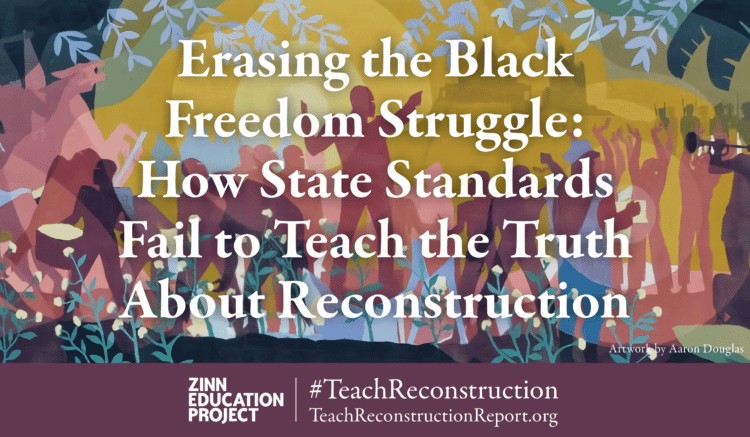





Twitter
Google plus
LinkedIn